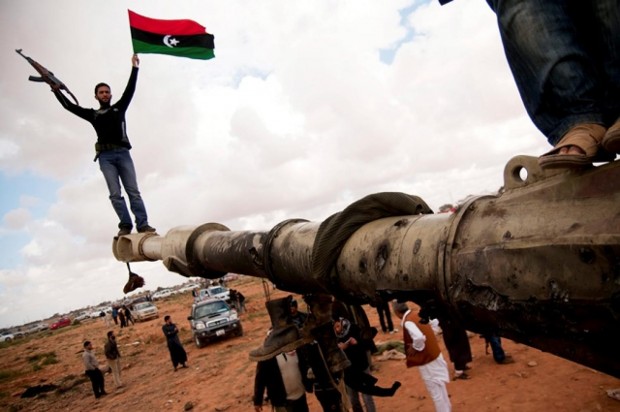CNN reports that Libya is “on the verge of implosion”

“No to the Killing of Ambassadors” is splashed in big letters across a pock-marked checkpoint in the desert between Misrata and Sirte in Libya. The reference to the attack against the United States in Benghazi makes you hopeful. But just an hour down the road, Sirte is controlled by the Islamic State in Iraq and Syria, along with about 120 miles of Libya’s coastline.
I just returned from Libya for the first time in over a year, and the situation is deteriorating. Libya should have showcased how the Arab Spring turned dictatorships into democracies. That’s what many, myself included, expected after Moammar Gadhafi’s brutal regime fell and a wave of good feeling swept across Libya. But too little was done to assist the transition — and we are now seeing the alarming consequences.
There are two, or depending how you count, four competing governments in the country now — the internationally recognized government in the east, an Islamist leaning government in Tripoli, the U.N.-backed unification government, and ISIS, which governs a growing amount of territory. In parts of Libya that are still safe, security is maintained by competing militias connected in a tenuous set of alliances.
Given this patchwork of governments and militias, Libya is tense, on the verge of implosion. Events while I was there are illuminating.
On February 17, the country celebrated five years since the revolution that freed Libya from 42 years of Gadhafi’s rule. Thousands were in the streets for what should have been a joyous anniversary, but Libyans I spoke with felt disillusionment not hope. And with good reason.
Two days later, the United States hit an ISIS compound in Sabratha, a town about 40 miles west of Tripoli, killing 41 militants. The mayor of Sabratha lauded the airstrike, claiming his government had no knowledge of ISIS’s presence. Three days later, hundreds of other ISIS fighters — who he also says he did not know about — stormed Sabratha, raising a black flag over the center of town.
East of Tripoli, Misratans are uneasy. People arrive from ISIS-controlled areas around Sirte. Stories are nightmarish. People are arrested and sentenced to death for cursing or smoking cigarettes. Executions are routine, including crucifixion. Residents estimate the population has dwindled to 10%. Those remaining are terrorized by ISIS, which uses tactics from Syria and Iraq, but with less opposition from the United States and its allies.
A Misrata brigade was dispatched into the desert to fight ISIS, but when we visited their bases and checkpoints, they indicated they are content to contain, not attack ISIS.
Part of the problem is Misrata militias are affiliated with the Islamist government controlling Tripoli. While publicly denouncing ISIS, they have little incentive to fight because they see the internationally recognized government in the east as their more immediate foe.
In the east, the government faces obstacles that also make rooting ISIS out of its stronghold in Sirte a low priority. Gen. Khalifa Haftar leads forces opposed to the Islamists. During the week I was there, he initiated an operation in Benghazi. Fighting was intense and some areas were cleared, but the militants they oppose include Ansar al Sharia and other groups, not only ISIS. Large parts of Benghazi are destroyed, but ISIS has hardly been weakened.
Both governments have called for assistance to fight ISIS, but other than the occasional airstrike, as in Sabratha, military support has been minimal. U.S. policy is focused, seemingly to the exclusion of other initiatives, on supporting U.N. efforts to establish a coalition to unify the governments in the east and the west. This important effort is worthy of U.S. support, but it’s not enough.
On my second to last day in Libya, the legislature in the east was scheduled to debate the U.N.-backed government, but the session was disrupted by an unruly minority and the vote was prevented again.
As U.N. Special Representative Martin Kobler told the Security Council on March 2, the overwhelming majority of Libyans want a unified, democratic government, but have been betrayed by small factions pursuing narrow political interests.
This is a problem that has plagued the transition from its beginning. Meanwhile, as Kobler warned, ISIS “takes advantage of the political and security vacuum and is expanding to the west, east and to the south. While Libya’s financial resources are dwindling, the criminal networks, including human smuggling, are booming.”
The United States should do more to support the unified government by helping to foster conditions inside Libya that will enable it to be received. This means working with U.N. and European allies to punish disruptive actors, using political pressure and sanctions. The United States must also support training programs to develop national security forces. Though challenging, no other country has the resources and experience to make such a difficult effort work.
Finally, President Obama should act on the Pentagon’s recommendation this month on a plan to fight ISIS in Libya, because waiting longer will mean ISIS is entrenched when we do fight them.
I’m realistic about what can presently be achieved in Libya, but allowing it to be a failed state should not be an option.
How to submit an Op-Ed: Libyan Express accepts opinion articles on a wide range of topics. Submissions may be sent to oped@libyanexpress.com. Please include ‘Op-Ed’ in the subject line.
- HoR-Backed Government moves to end fuel subsidy - December 26, 2024
- Libya and Algeria bolster customs cooperation - December 24, 2024
- Reports claim S-400, S-300 missiles moved to Libya - December 24, 2024


